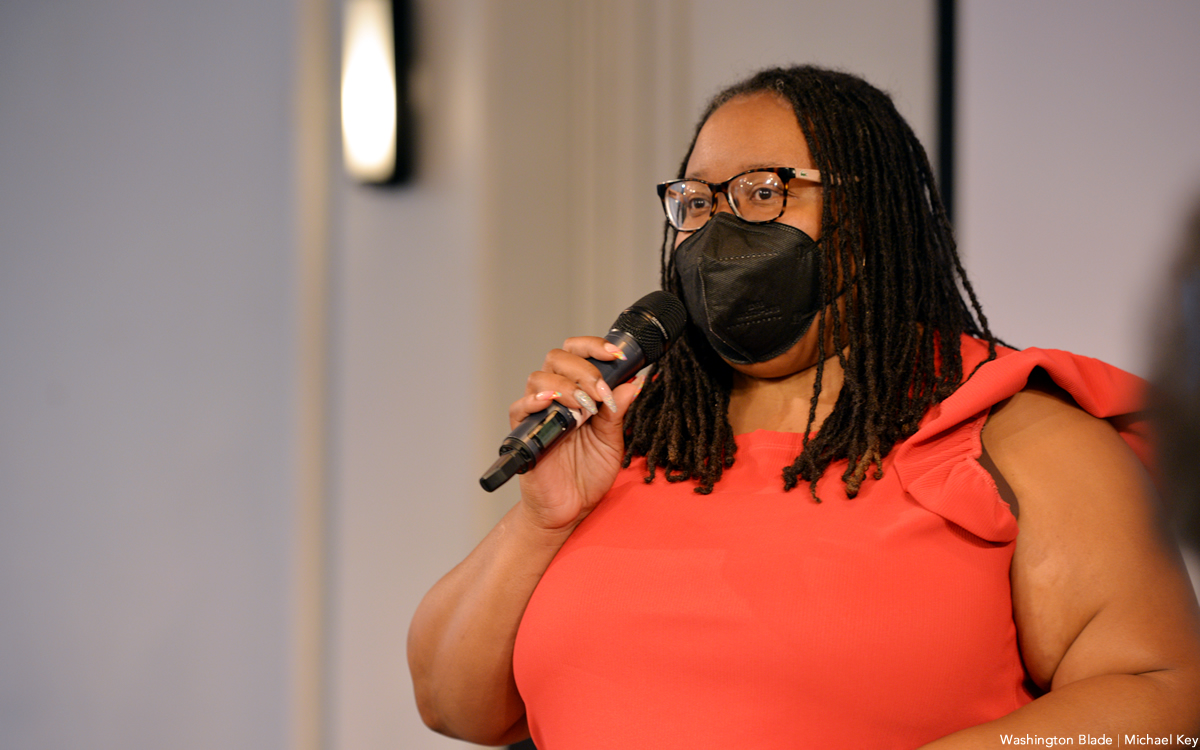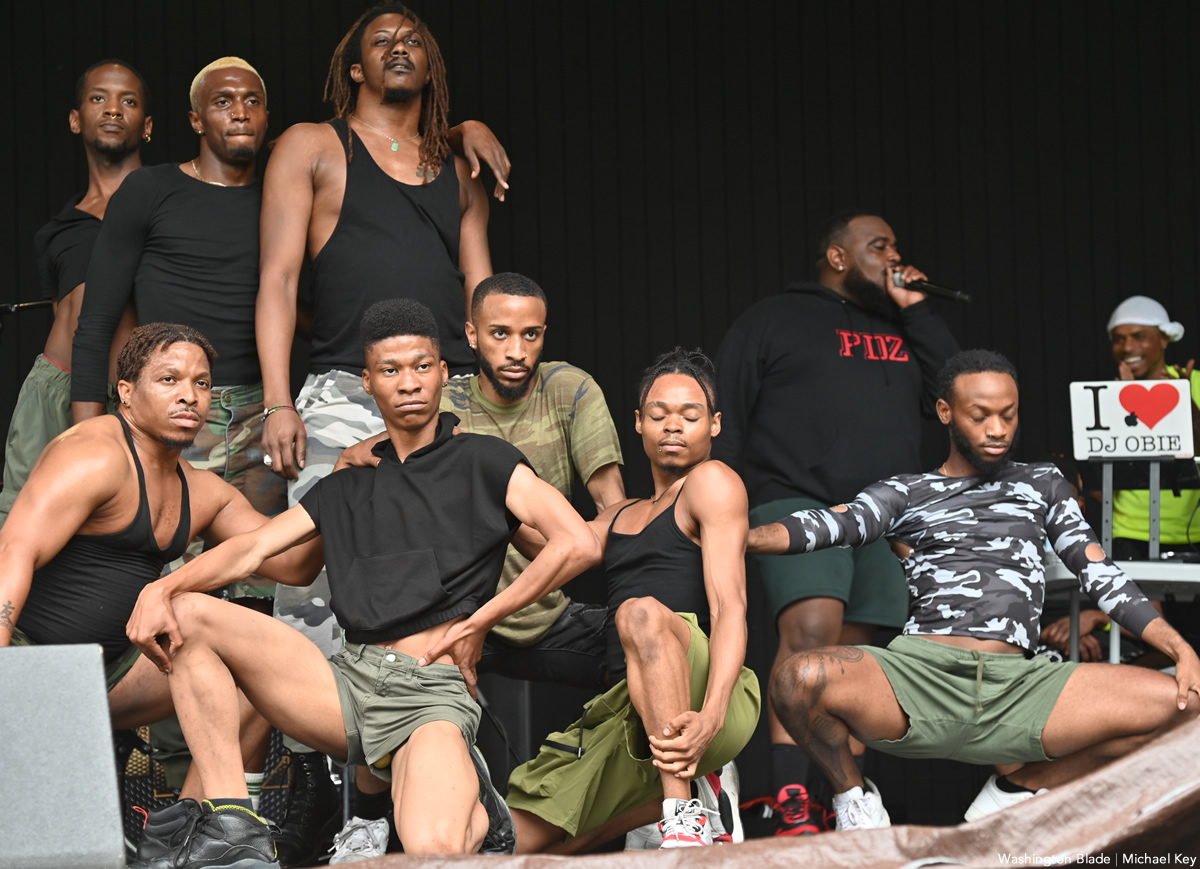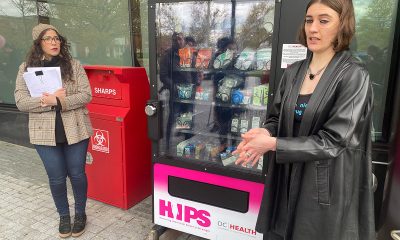District of Columbia
Newly diagnosed HIV cases increased slightly in D.C. in 2021
Report cautions fewer people were tested during COVID-19 pandemic

The D.C. Department of Health’s Annual Epidemiology and Surveillance Report released on Tuesday shows there were 230 newly diagnosed HIV cases in the D.C. in 2021, the most recent year in which data have been analyzed.
The report says the 230 cases in 2021 represents an 83 percent decline in new cases from the peak number of 1,374 cases in 2007, but a slight increase from 219 cases reported in 2020. The report shows there were 273 newly reported HIV cases in 2019, 331 cases in 2018 and 386 in 2017.
In addition to HIV, the report includes data related to the number of newly reported cases of hepatitis, tuberculosis, and other sexually transmitted infections such as syphilis, gonorrhea and chlamydia.
“Annual surveillance data is critical to our understanding of disease trends and our planning and programmatic efforts to control and prevent disease,” the report says. “However, the data in this year’s report must be examined in the context of the COVID-19 pandemic. The pandemic continues to have an immense impact on the availability, accessibility and utilization of disease screening, prevention, and care services,” according to the report.
Among other things, the report says the D.C. Department of Health, to which it refers as D.C. Health, saw a 20 percent decline in the volume of HIV, chlamydia, gonorrhea, syphilis and hepatitis laboratory reports received in 2020 compared to 2019, indicating fewer people were being tested and diagnosed for the diseases.
“HIV lab volume decreased further from 2020 to 2021 with a 20 percent decline, and an overall decline from 2019 to 32 percent,” the report says. “Given disruptions to screening services, the potential for underdiagnosis and underreporting is most substantial for those with asymptomatic infections,” it says.
The Annual Epidemiology and Surveillance Report was released at a Tuesday event at the city’s Town Hall Education Arts Recreation Campus in Southeast D.C. in commemoration of Black HIV/AIDS Awareness Day.
Among those who attended or spoke were Harold Phillips, director of the White House Office of National AIDS Policy, and Dr. Demetre Daskalakis, deputy coordinator of the White House Mpox Response who’s on leave from his role as director of HIV/AIDS Prevention at the U.S. Centers for Disease Control and Prevention.
Also participating in the event were Rita Harcrow-Flegel, drector of the U.S. Department Housing and Urban Development’s Office of HIV/AIDS Housing; Dr. Sharon Lewis, interim director of D.C. Health; Clover Barnes, senior deputy director of D.C. Health’s HIV/AIDS, STD, and TB Administration, and Erin Whelan, executive director of the D.C. LGBTQ youth advocacy group SMYAL.
Statements at the event by the White House and D.C. officials and a statement released by the office of D.C. Mayor Muriel Bowser point to stepped up efforts by D.C. to provide HIV testing and treatment services to all those at risk for HIV, including services free of charge for those unable to pay for them.
Among the services announced is the availability of Post Exposure Prophylaxis, or PEP, a medication D.C. Health is offering free of charge that is taken to prevent HIV infection if taken within 72 hours of being exposed to HIV. Also available, officials said, is the medication known as Pre-Exposure Prophylaxis, or PrEP, which, when taken as a daily pill, prevents people from becoming infected with HIV. That too is available free of charges for those in need, the statement from the mayor’s office says.
“We want people in D.C. to know their status and get connected to the right care at the right time — with no shame or stigma attached,” Bowser said in the statement. “We have so many fantastic healthcare partners in D.C., and they have helped us expand access to free PEP, free PrEP, free condoms, free at-home tests, and more,” the mayor said. “Now, we need to make sure people know what’s available and how to access it.”
The statement calls on the public, especially those at risk for HIV, to access information about the city’s HIV prevention and support related services through a new website: sexualbeing.org.
It says the city continues to push for its “bold goal” of having fewer than 21 new HIV diagnoses each year by 2030. It says the city is also stepping up efforts to ensure that everyone who tests positive for HIV will quickly access the anti-retroviral medication that, if used as directed, prevents HIV related illness and suppresses a person’s HIV viral load to a point where they cannot transmit HIV to another person through sexual contact.
The newly released report includes these findings for the year 2021:
• There were 11,904 current D.C. residents, or 1.8 percent of the population, living with HIV in 2021.
• Sexual contact was the leading mode of transmission of newly diagnosed HIV cases in 2021.
• There were 230 newly diagnosed HIV cases in 2021, a small increase over the 219 new cases reported in 2020, but a significant drop from the 1,373 cases in the peak year of 2007 and the continued decline in cases in subsequent years.
• The proportion of people living with HIV in D.C. in 2021 that are Black is 71 percent
• The proportion of Black men diagnosed with HIV in 2021 who have sex with men (MSM) was 35 percent.
• The proportion of white men diagnosed with HIV in 2021 who have sex with men (MSM} was 8 percent.
• The proportion of Black heterosexual men diagnosed with HIV in 2021 was 8 percent.
• The proportion of Black heterosexual women diagnosed with HIV in 2021 was 15 percent.
• The report does not show the proportion of white heterosexual men who tested positive for HIV in 2021.
• The proportion of transgender persons diagnosed with HIV in 2021 was 3.5 percent.
• In 2021, the overall gender breakdown in the proportion of newly diagnosed HIV cases was 73.9 percent male and 22.6 percent female.
The report was expected to be posted for access on the D.C. Health website at www.dchealth.dc.gov
District of Columbia
New D.C. LGBTQ+ bar Crush set to open April 19
An ‘all-inclusive entertainment haven,’ with dance floor, roof deck

D.C.’s newest LGBTQ+ bar called Crush is scheduled to open for business at 4 p.m. on Friday, April 19, in a spacious, two-story building with a dance floor and roof deck at 2007 14th St., N.W. in one of the city’s bustling nightlife areas.
A statement released by co-owners Stephen Rutgers and Mark Rutstein earlier this year says the new bar will provide an atmosphere that blends “nostalgia with contemporary nightlife” in a building that was home to a popular music store and radio supply shop.
Rutgers said the opening comes one day after Crush received final approval of its liquor license that was transferred from the Owl Room, a bar that operated in the same building before closing Dec. 31 of last year. The official opening also comes three days after Crush hosted a pre-opening reception for family, friends, and community members on Tuesday, April 16.
Among those attending, Rutgers said, were officials with several prominent local LGBTQ organizations, including officials with the DC Center for the LGBTQ Community, which is located across the street from Crush in the city’s Reeves Center municipal building. Also attending were Japer Bowles, director of the Mayor’s Office of LGBTQ Affairs, and Salah Czapary, director of the Mayor’s Office of Nightlife and Culture.
Rutgers said Crush plans to hold a grand opening event in a few weeks after he, Rutstein and the bar’s employees become settled into their newly opened operations.
“Step into a venue where inclusivity isn’t just a promise but a vibrant reality,” a statement posted on the Crush website says. “Imagine an all-inclusive entertainment haven where diversity isn’t just celebrated, it’s embraced as the very heartbeat of our venue,” the statement says. “Welcome to a place where love knows no bounds, and the only color or preference that matters is the vibrant tapestry of humanity itself. Welcome to Crush.”
The website says Crush will be open Tuesdays and Wednesdays from 4 p.m. to 12 a.m., Thursdays from 4 p.m. to 2 a.m., Fridays from 4 p.m. to 3 a.m., Saturdays from 2 p.m. to 3 a.m., and Sundays from 2 p.m. to 12 a.m. It will be closed on Mondays.
Crush is located less than two blocks from the U Street Metro station.
District of Columbia
Reenactment of first gay rights picket at White House draws interest of tourists
LGBTQ activists carry signs from historic 1965 protest

About 30 LGBTQ activists formed a circular picket line in front of the White House Wednesday afternoon, April 17, carrying signs calling for an end to discrimination against “homosexuals” in a reenactment of the first gay rights protest at the White House that took place 59 years earlier on April 17, 1965.
Crowds of tourists looked on with interest as the activists walked back and forth in silence in front of the White House fence on Pennsylvania Avenue. Like the 1965 event, several of the men were dressed in suits and ties and the women in dresses in keeping with a 1960s era dress code policy for protests of the Mattachine Society of Washington, D.C., the city’s first gay rights group that organized the 1965 event.
Wednesday’s reenactment was organized by D.C.’s Rainbow History Project, which made it clear that the event was not intended as a protest against President Joe Biden and his administration, which the group praised as a strong supporter of LGBTQ rights.
“I think this was an amazing event,” said Vincent Slatt, the Rainbow History Project official who led efforts to put on the event. “We had twice as many that we had hoped for that came today,” he said.
“It was so great to see a reenactment and so great to see how far we’ve come,” Slatt said. “And also, the acknowledgement of what else we still need to do.”
Slatt said participants in the event who were not carrying picket signs handed out literature explaining the purpose of the event.
A flier handed out by participants noted that among the demands of the protesters at the 1965 event were to end the ban on homosexuals from working in the federal government, an end to the ban on gays serving in the military, an end to the denial of security clearances for gays, and an end of the government’s refusal to meet with the LGBTQ community.
“The other thing that I think is really, really moving is some of the gay staff inside the White House found out this was happening and came out to greet us,” Slatt said. He noted that this highlighted how much has changed since 1965, when then President Lyndon Johnson’s White House refused to respond to a letter sent to Johnson from the Mattachine Society explaining its grievances.
“So now to have gay people in the White House coming out to give us their respects and to say hello was especially meaningful to us,” Slatt said. “That was not expected today.”
Among those walking the picket line was longtime D.C. LGBTQ rights advocate Paul Kuntzler, who is the only known surviving person who was among the White House picketers at the April 1965 event. Kuntzler said he proudly carried a newly printed version of the sign at Wednesday’s reenactment event that he carried during the 1965 protest. It stated, “Fifteen Million Homosexuals Protest Federal Treatment.”
Also participating in the event was Japer Bowles, director of D.C. Mayor Muriel Bowser’s Office of LGBTQ Affairs. Bowles presented Slatt with a proclamation issued by Bowser declaring April 17, 2024, Mattachine Society Day in Washington, D.C.
“Whereas, on April 17, 1965, the Mattachine Society of Washington courageously held the nation’s inaugural picket for gay rights, a seminal moment in the ongoing struggle for LGBTQIA+ equality in the United States, marking the genesis of public demonstrations advocating for those rights and paving the way for Pride Marches and Pride celebrations worldwide,” the proclamation states.
About 30 minutes after the reenactment event began, uniformed Secret Service agents informed Slatt that due to a security issue the picketers would have to move off the sidewalk in front of the White House and resume the picketing across the street on the sidewalk in front of Lafayette Park. When asked by the Washington Blade what the security issue was about, one of the Secret Service officers said he did not have any further details other than that his superiors informed him that the White House sidewalk would have to be temporarily cleared of all people.
Participants in the event quickly resumed their picket line on the sidewalk in front of Lafayette Park for another 30 minutes or so in keeping with the 1965 picketing event, which lasted for one hour, from 4:20 p.m. to 5:20 p.m., according to Rainbow History Project’s research into the 1965 event.
Although the LGBTQ picketers continued their procession in silence, a separate protest in Lafayette Park a short distance from the LGBTQ picketers included speakers shouting through amplified speakers. The protest was against the government of Saudi Arabia and organized by a Muslim group called Al Baqee Organization.
A statement released by the Rainbow History Project says the reenactment event, among other things, was a tribute to D.C.-area lesbian rights advocate Lilli Vincenz, who participated in the 1965 White House picketing, and D.C. gay rights pioneer Frank Kameny, who founded the Mattachine Society of Washington in the early 1960s and was the lead organizer of the 1965 White House protest. Kameny died in 2011 and Vincenz died in 2023.
The picket signs carried by participants in the reenactment event, which were reproduced from the 1965 event, had these messages:
• “DISCRIMINATION Against Homosexuals is as immoral as Discrimination Against Negroes and Jews;”
• “Government Should Combat Prejudice NOT PROMOTE IT”
• “White House Refuses Replies to Our Letters, AFRAID OF US?
• “HOMOSEXUALS Died for their Country, Too”
• “First Class Citizenship for HOMOSEXUALS”
• “Sexual Preference is Irrelevant to Employment”
• “Fifteen Million U.S. Homosexuals Protest Federal Treatment”
District of Columbia
Organizers announce details for D.C. Black Pride 2024
Most events to take place Memorial Day weekend at Westin Downtown

The Center for Black Equity, the organizer of D.C. Black Pride, the nation’s first and one of the largest annual African-American LGBTQ Pride celebrations, announced this year’s event will take place Memorial Day Weekend from May 24-27.
The announcement, released April 16, says that most 2024 D.C. Black Pride events will take place at the Westin Washington, D.C. Downtown Hotel at 999 9th St, N.W.
“With the theme Black Pride Forever, the event promises a weekend filled with vibrant celebrations, empowering workshops, and a deep exploration of Black LGBTQIA+ history and culture,” the announcement says.
It says events will include as in past years a “Rainbow Row” vendor expo at the hotel featuring “organizations and vendors created for and by the LGBTQIA+ community” offering products and services “that celebrate Black excellence.”
According to the announcement, other events include a Health and Wellness Festival that will offer workshops, demonstrations, and activities focused on “holistic well-being;” a Mary Bowman Poetry Slam “showcasing the power and beauty of spoken word by Black LGBTQIA+ artists;” the Black Pride Through the Decades Party, that will celebrate the “rich history of the Black LGBTQIA+ movement;” and an Empowerment Through Knowledge series of workshops that “delve into various topics relevant to the Black LGBTQIA+ community.”
Also, as in past years, this year’s D.C. Black Pride will feature its “Opening Night Extravaganza” reception and party that will include entertainment and live performances.
The announcement notes that D.C.’s annual Black Pride celebration, started in 1991 as a one-day outdoor event at Howard University’s Banneker Field, has inspired annual Black LGBTQ Pride events across the United States and in Canada, United Kingdom, Brazil, Africa, and the Caribbean. More than 300,000 people attend Black LGBTQ Pride events each year worldwide, the announcement says.
Full details, including the official schedule of events, can be accessed at dcblackpride.org.
-

 Africa5 days ago
Africa5 days agoCongolese lawmaker introduces anti-homosexuality bill
-

 District of Columbia2 days ago
District of Columbia2 days agoReenactment of first gay rights picket at White House draws interest of tourists
-

 District of Columbia1 day ago
District of Columbia1 day agoNew D.C. LGBTQ+ bar Crush set to open April 19
-

 Arizona2 days ago
Arizona2 days agoAriz. governor vetoes anti-transgender, Ten Commandments bill












